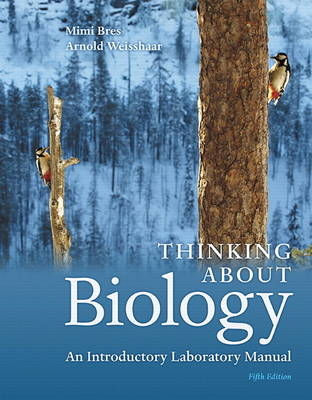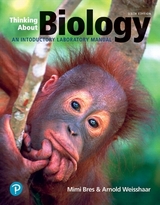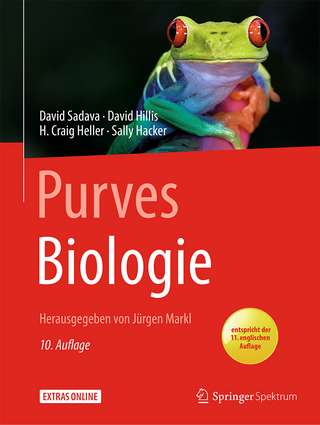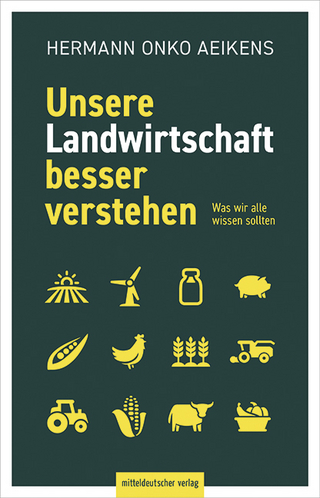
Thinking About Biology
Pearson (Verlag)
978-0-13-403316-7 (ISBN)
- Titel erscheint in neuer Auflage
- Artikel merken
This manual offers a unique, extensively class-tested approach to introductory biology laboratory. A full range of activities show how basic biological concepts can be applied to the world around us. This lab manual helps students:
Gain practical experience that will help them understand lecture concepts
Acquire the basic knowledge needed to make informed decisions about biological questions that arise in everyday life
Develop the problem-solving skills that will lead to success in school and in a competitive job market
Learn to work effectively and productively as a member of a team
The Fifth Edition features many new and revised activities based on feedback from hundreds of students and faculty reviewers.
Mimi Bres, Ph.D. Professor and Arnold Weisshaar, Professor Emeritus, Department of Biological Sciences, Prince George’s Community College in Largo, Maryland. Mimi Bres, Ph.D, tenured Professor, Prince George's Community College, Largo, Maryland Dr. Bres has over 20 years experience with the development of curriculum materials designed to stimulate interest in science and to improve critical thinking skills. Of particular note is her recent work developing an interactive web and video-based curriculum, including a virtual field component, to teach environmental concepts without the need for student travel. Dr. Bres has also worked as a consultant to corporations and government agencies. She served as team leader and developer for the Environmental Protection Agency's Environmental Education Library, a series of video curriculum modules for college and high school classes which highlight hazardous chemical response and remediation projects carried out under the SuperFund Program. Dr. Bres has also served as a consultant to the Prince George's County School District in an initiative to improve the delivery of high school science courses. As a result of her expertise, Dr. Bres has been an invited speaker at a number of national meetings and seminars. Her work on the use of cooperative learning techniques has improved both student performance and interest in science. Dr. Bres' excellence in science education has been recognized by her selection for the National Award for Innovative Excellence in Teaching, Learning, and Technology by the Center for the Advancement of Teaching and Learning, the Teaching Recognition Award by the University of Maryland University College, and Outstanding Faculty Mentor of the Year by the science division students of Prince George's Community College. Recent books include: Thinking About Biology, 4th edition (a laboratory manual for general biology), Hands-On Biology: Laboratories for Distance Learning (a laboratory manual for online general biology courses), Human Biology: Condensed, 7th edition (a simplified lecture study guide that incorporates problem solving activities into the curriculum), and Cooperative Learning: Making Connections in General Biology (a collection of cooperative activities). Arnold Weisshaar, Professor Emeritus, Prince George's Community College, Largo, Maryland Professor Weisshaar has had a distinguished 36 year career in higher education. During his career, he has been the spearhead of several initiatives to improve science education and expand the College's program offerings. In the classroom, Professor Weisshaar has worked extensively with underprepared students of diverse social and ethnic backgrounds. In an attempt to improve instructional delivery, he has co-authored a variety of support materials for students. Recent publications include laboratory manuals for general biology, including: Thinking About Biology, 4th edition and Hands-On Biology: Laboratories for Distance Learning and a simplified lecture study guide that incorporates problem solving activities into the curriculum (Human Biology: Condensed, 7th edition). In the course of developing the above-mentioned materials, Professor Weisshaar became interested in cooperative learning strategies as a tool for engaging students. In the succeeding years, he has become adept at applying cooperative learning techniques to various learning situations and in that regard, has co-authored a collection of cooperative activities (Cooperative Learning: Making Connections in General Biology). In addition to his classroom activities, Professor Weisshaar has been an active participant in organizing programs to facilitate professional development for colleagues within his institution and throughout the state of Maryland.
Preface
Exercise 1. Introduction to the Scientific Method
Exercise 2. Windows to a Microscopic World
Exercise 3. Functions and Properties of Cells
Exercise 4. Movement of Molecules Across Cell Membranes
Exercise 5. Investigating Cellular Respiration
Exercise 6. Photosynthesis
Exercise 7. Organic Molecules and Nutrition
Exercise 8. Factors that Affect Enzyme Activity
Exercise 9. Introduction to Molecular Genetics
Exercise 10. Mitosis and Asexual Reproduction
Exercise 11. Connecting Meiosis and Genetics
Exercise 12. Human Genetics
Exercise 13. Evolution
Exercise 14. Functions of Tissues and Organs
Exercise 15. The Cardiovascular System
Exercise 16. Introduction to Anatomy: Dissecting the Fetal Pig
Exercise 17. Organs of the Abdominal Cavity
Exercise 18. Introduction to Forensic Biology
Exercise 19. Biotechnology: DNA Analysis
Exercise 20. Using Biotechnology to Assess Ecosystem Damage
Exercise 21. Ecosystems
Exercise 22. Population Ecology
Appendix I. Game Cards for Ex. 21
Appendix II. Self-Test Answers
| Erscheint lt. Verlag | 18.5.2015 |
|---|---|
| Sprache | englisch |
| Maße | 215 x 275 mm |
| Gewicht | 830 g |
| Themenwelt | Schulbuch / Wörterbuch |
| Naturwissenschaften ► Biologie | |
| ISBN-10 | 0-13-403316-7 / 0134033167 |
| ISBN-13 | 978-0-13-403316-7 / 9780134033167 |
| Zustand | Neuware |
| Haben Sie eine Frage zum Produkt? |
aus dem Bereich



